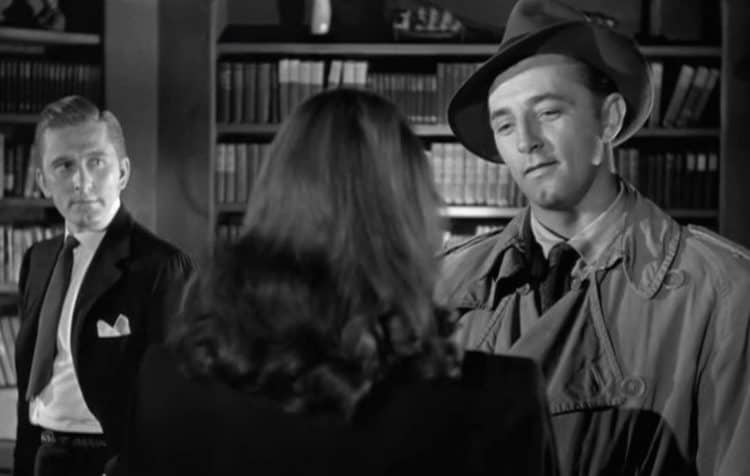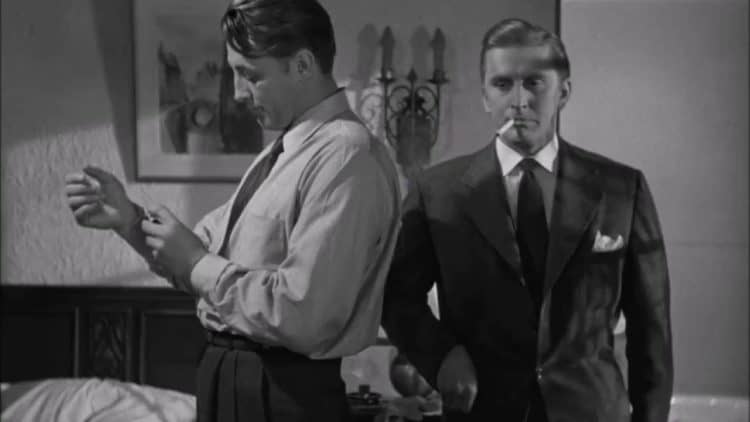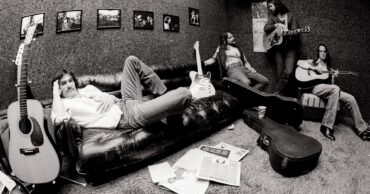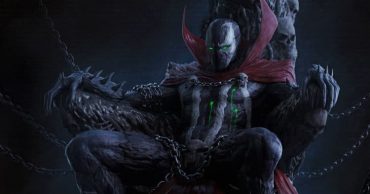
Like many movie lovers, I had a vague notion of film noir but had no real idea what it was. Turns out, film noir is one of my favorite types of cinema and I didn’t even know it! I am a huge fan of the edgier, gritty, darker types of movies but I was unaware that they necessarily fall under the listing of film noir. I had always associated noir with pulp detective books from the 1950s so to define noir in a cinematic context was a very pleasant revelation. The 1947 Jacques Tourneur film Out of the Past is “a stylish and devastating noir” (RG) that serves as the benchmark against which all other films noirs should be evaluated. The film quite simply represents “nothing short of a noir masterclass” (RG). Out of the Past embodies my genuine introduction to film noir proper and should be required viewing for any true film noir enthusiast.
From what I could piece together through the ever present fog of cigarette smoke, I liked Out of the Past. It would be fair to say that my affections for Out of the Past are derived more so of an appreciation for the piece rather than a fondness for it. It has been stated that “there is considerable disagreement over what exactly film noir is” (Belton) but whatever the definition, Out of the Past simply reeks of it. I liked Out of the Past, I didn’t love it. It was a great film however and as an example of film noir, Out of the Past hits it out of the park. It simply covers all the bases — “the private eye, the femme fatale, the labyrinthine plot, the tough, smart dialogue, the story told in flashback and voiceover, the cinematic interplay of shadow and light” (Orr). Upon my first viewing of Out of the Past, there were a few items of the film that especially engaged my interest.

The first thing I noticed when the scenario became evident is that the 1984 film Against All Odds was an obvious reimagining of the plot established in Out of the Past. I only wish Phil Collins provided an Academy Award nominated song for Out of the Past as he did for Against All Odds. I also found it interesting that Kirk Douglas’s role of Whit Sterling was embodied by James Woods as Jake Wise, essentially exchanging Whit for Wise. For some reason, Out of the Past also provided me with a new perspective regarding the actress who played the mother of the Jane Greer character in Against All Odds. As an aside, the organization and plotline of Out of the Past also sparked shades of the 2005 David Cronenberg film A History of Violence.
I enjoyed the witty dialogue and the coy repartee but at times, I found the shear insistent volume of the sharp banter a tad overwhelming. After every line, I felt as though I had to wait in anticipation for the clever retort. Nonetheless, the greatness of the writing is undeniable. The screenplay was written by Daniel Mainwaring, adapted from his own novel “Build My Gallows High”, originally published in 1946.
The acting performances of Robert Mitchum, Jane Greer and Kirk Douglas were all superior. It is truly a shame that Jane Greer was caught under Howard Hughes’ thumb as she was. She had a successful career that should have been the stuff of legend based upon her talents, clearly evidenced by her performance in Out of the Past. The chiaroscuro cinematography flawlessly employed by Nicholas Musuraca only added to her screen mystique. Greer later stated “It was so dark on set, you didn’t know who else was there half the time” (RG). With unaccredited script additions by the prolific James M. Cain, “author of noir landmarks The Postman Always Rings Twice and Double Indemnity” (RG), Greer’s femme fatale persona was made all the more effective with lines such as: “She can’t be all bad – no one is”. To which the Mitchum character shoots back: “She comes the closest.”
“No one ever smoked and brooded and loomed like Robert Mitchum. And he never did it as definitively as he does in Out of the Past” (RG). Bob Mitchum evokes the impression of a world weary, battle riddled, love wounded ex-police detective in his 50s who is fairly familiar with the feel of a bottle. I would have never believed the guy was barely 30 at the time.
Kirk Douglas is an icon and one of the most celebrated actors of all time but I was shocked to learn that this was only his second film. Douglas intoxicates as Whit Sterling, the “shrewd villain who possesses a warped type of ethical code and a pleasant personality” (Simmons). It did seem to me though as if he was trying to pull off his best Kirk Douglas impersonation. This is because the Kirk Douglas persona had not been born yet. Perhaps it can be surmised that out of the ashes of Out of the Past rose the emblematic mode that would define his career and enrich the art of movie making for the next 70 years.

Another aspect of the film I love (typical film noir) is the fact that it is quite obvious that the protagonist is hopeless from the outset. As Paul Schrader in the 1994 American Film Series explains, “The sense of knowing what you are doing is doomed, and you can’t stop it”. This theme is captured fairly accurately after Kathie (Greer) tells Jeff (Mitchum) she doesn’t want to die to which Jeff responds: “Neither do I, baby, but if I have to, I’m going to die last”.
The most enjoyable element of Out of the Past was definitely the ominous, unnerving, anxiety ridden mood that Tourneur creates. The suspenseful tension generated within this film is simply distressing and uncomfortable in the most fantastic of ways. Tourneur was particularly successful achieving this element characteristic of film noir by utilizing shift in perspective. What makes Tourneur’s use of perspective shift so disturbing is his ability to disrupt the narrative linearity of the film. This is seen with the flashback sequences that dominate the first half of the picture as Jeff exposes his true self to the innocent Ann. However, Out of the Past is unique, even among other films noirs, in that the film succeeds in shifting registers not only in time and space but in tone and mood. The film’s narrative shits from joyous, lustful, bliss to hopeless, faithless, misery. Even more unsettling, Tourneur uses the femme fatal as the personification of these shifts. Kathie is undoubtedly the most fatal of femmes, viewed most of the film through the lens of the reliably present film noir regulars of shadow and low-key lighting but when first introduced to the audience, which occurs in flashback, she is described by Jeff: “And then I saw her coming out of the sun, and I knew why Whit didn’t care about that 40 grand”. Seeing Kathy as both light and dark at different points in the picture only add to the inherent disconcerting “narrative disjunction” (Belton).
Overall, this is an extremely well done, entertaining film. I am grateful that my path finally intersected with this piece, not only for exposing me to Jacques Tourneur’s masterpiece but for introducing me to film noir in earnest. Tourneau’s genius is on full display as “the seductive skill of the movie lies in its masterful evocation of that sensual, fatalistic bleakness crucial to noir” (RG). The quality of the film itself however pales in comparison to its contributions as the archetype for what Roger Ebert described as “The most American film genre”. After viewing this film, any doubts of what true film noir is will certainly be elucidated. Out of the Past encapsulates everything righteous film noir should be by reinforcing the maxim that while there is no way to win, “There’s a way to lose more slowly”.
Works Cited:
- Belton, J. American Cinema/American Culture. New York: McGraw-Hill, 2013. 228. Print.
- Orr, C. (July 13, 2004). The Movie Review: ‘Out of the Past’. Retrieved October 25, 2018
- RG (November 29, 2013). Top 10 Film Noir. Retrieved March 8, 2019
- Simmons, A, (March 2017). Senses of Cinema: Out of the Past. Retrieved October 28, 2018
 Follow Us
Follow Us





